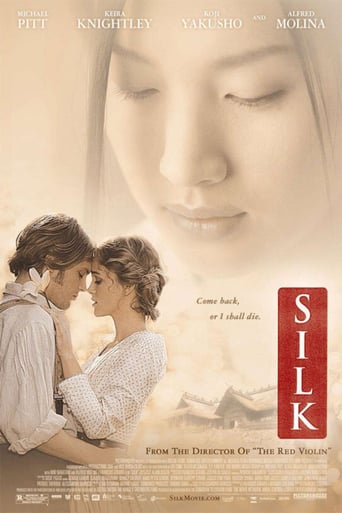tedg
Gosh, yet another movie with a delicious idea, but mediocre execution. The thing is boring in a pretty way and vaguely calls up romantic notions of singular love. You may not make it until the end, but I urge you to, because the structure is delicious.It has a triple frame, skeins between two worlds and a one-armed billiard master who triggers all. One frame is the man in the story, the target of love, sitting in a garden that his now-dead wife has unfolded for him. He is sitting with his wife's designated listener, and he recites the story that we have seen leading to this. Another frame is the letter which I will focus on. This letter is the centerpiece of a scene quite late in the movie. I know this is originally a book, but it seems to be one conceived cinematically so it is fair to say that this scene is likely to have been envisioned first. We have an ordinary, truly nondescript Frenchman who is chosen to be the connection between two worlds, his world of the earth and garden and another exotic world. He finds a love in both worlds, each natural to the forces in that world.His love at home is played by a dull Keira Knightly. His love in Japan is a Chinese woman, unreachable. This letter is to him in France, from that Chinese woman, writing in Japanese from a location whence she was taken to make her unreachable to him. Now the letter is read to him in the scene that is highly structured. We look at the woman reading, a lovely Asian woman who acts as surrogate writer. We see our man in a mirror, and it is the mirror folds that are wonderful here.This letter is a mirror of one first passed to him. That letter is literally folded in the Shinto fashion where the strokes of the calligraphy are intended to bleed into each other as metapoetry. This second letter is later unfolded when our man comes back to this reader and all is revealed. Here is the structure:The Chinese lover who wrote the letter was a second concubine to a warlord with an honored wife. This lover had her affair with our man through a surrogate concubine. Her letter is read in the scene by another professional surrogate, a (high class) Japanese prostitute in France, who herself is one step removed from her lost Eurpoean love. She reads the letter as if she were the distant Chinese lover. But wait! She actually did write the letter in a conflation of folds of distance-surrogacy and the inherent two-world nature of romance. But wait again, for in yet another fold of the letter we learn that though the alluring prostitute did write the letter, she did not compose it. That was done by the French wife, in a secret act of love.Love, my folded readers, love as a carefully folded letter.Here is the letter. Note the peculiar grammar of "sense" at the end:My dear master, do not be afraid. Do not move. Do not speak. No one will see us. Stay as you are. I want to look at you. We have the night to ourselves and I want to look at you. Your body for me, your skin, your lips... close your eyes. No one can see us, and I am here at your side. Do you feel me?When I touch you for the first time, it will be with my lips. You will feel the warmth, but you will not know where. Perhaps it will be on your eyes. I will press my mouth to your eyes and you will feel the warm. Open your eyes now my beloved. Look at me, your eyes on my breasts, your arms lifting me, letting me slide onto you. My faint cry. Your body quivering. There is no end to it, don't you see?You will forever be throwing your head back. I will forever be shaking off my tears.This moment had to be. This moment is, and this moment will continue, from now until forever. We shall not see one another again; what we were meant to do we have done. Believe me my love, we have done it forever. Preserve your life out of my reach, and if it serves your happiness, do not hesitate for a moment to forget this woman for no sense without a trace of regret. Farewell.Ted's Evaluation -- 2 of 3: Has some interesting elements.
Danielle
I was getting really irritated with this film about 3/4 of the way through because it seemed to be heading in a very stereotypical and predictable direction, but then it shifted and ended in a way that I found surprising in the best sense of that word - I was glad that it was not what I expected and I was glad that it surprised me. It IS slow, but not in a bad way - it's very beautiful and contemplative and some movies deserve a slower pace. I don't think that Michael Pitt was perfectly cast, and although I think he's quite talented, I think another actor might have given the character more gravitas and substance. But he doesn't ruin the film. It's not everyone's cup of tea, but if you don't mind a slower paced film and you like historical movies, it's very much worth seeing.
jotix100
Herve Joncour, a young man in France, fresh from the army, receives a proposal he cannot refuse: he must go to Japan to collect silk worms and bring them to France where the silk industry has been dying because of a plague that has affected them. Before he undertakes the trip to the East, he marries the beautiful woman he loves, Helene. Since the action takes place in the middle of the XIX century, such an endeavor was not without its risks.When Herve gets to Japan, he encounters an exotic place where he is made to go blindfolded to an unknown area searching for the worms. As he deals with the ruthless man that is key to selling the treasure to bring back, he meets a mysterious woman who captures his imagination and gets the best of him. Since they don't exchange a word, Herve's mind is full of her exotic beauty.He returns to France and becomes rich from the silk that is produced using the worms he has brought back. Helene, has waited for him, but her only regret is that she never conceives a child to make her complete. Herve has no problem adapting himself to the duplicity within his heart.On the second trip to Japan, Herve receives a note from the woman that dominates his thoughts. Since it's written in Japanese characters, he has no way of knowing what she meant. For that, he must secure the help of a Madame of a house of ill repute in Lyons. The message, when is read by the lady confounds him completely. What is he to make out of the strange message? Something happened to Alessandro Baricco's novel "Silk" on the way to the movies. The novel, one of the best narratives by the author, was a pleasure to read. The screen adaptation by its director Francois Girard and Michael Golding, is not as poetic as this team probably intended to. Where the book felt almost like a poem, the film doesn't do the same for us, who have admired Mr. Baricco's work. It deserved better.The problem appears to be in the casting the role of Herve. Michael Pitt mumbles most of his way throughout the film. His take on the character is what, in our humble opinion, derails the film. This part needed someone who could make the viewer believe Herve's passion going on in his head, but unfortunately, being because of Mr. Girard's direction, or Mr. Pitt's inability to make Herve come alive, one doesn't get that impression.Kira Knightly has a small role as Helene. Ms. Knightly doesn't show much chemistry with Mr. Pitt, thus their scenes feel flat. Sei Ashina, who is seen as the object of desire, gives the right tone to her performance. Alfred Molina appears as the sponsor of Herve.The best thing in the film is the cinematography of Alain Dostie, who photograph the beautiful backgrounds with loving care. Visually, the film will please the viewer going without having read the novel. The Japanese and Italian natural settings worked miracles for a film that shows almost no substance.
CountZero313
A trader from Japan arrives in a small English village in the mid-19th century. He is not particularly handsome or charismatic, he can't even speak English, but the town leader's vivacious, sultry wife, played by Keira Knightley, falls in love with the Japanese man and urges him to take her away. Why? Because any Japanese man who turns up has to be better than what the British male has to offer. The Japanese man is haunted by a glimpse he caught of Keira naked, slowly immersing herself in river water. Finally, he realises it is all an illusion, and that the woman he truly loves is his recently deceased Japanese wife. His wife then replaces Keira in his dreams of the river, but decently clothed...You don't buy it, do you? Then why are we expected to swallow it in reverse? This is a lusciously shot, lyrical, understated piece of orientalist claptrap. Michael Pitt takes insipid to new levels, and Sei Ashina has to put up with a credit as 'The Girl,' probably because they couldn't get away with calling her 'Asian Eye Candy.' Not surprisingly, Sei Ashina is a newcomer - no experienced Japanese actress worth her salt would have taken on such a demeaning role. Ashina will forever live down her involvement in this film, I fear.This should have been a breakout film for the wonderful Miki Nakatani, but she is lost in a stilted role. Koji Yakusho is as forceful as ever, and as such is mis-cast - why would any woman leave this guy, especially for a simpering Eurobrat? The reveal at the end shows, ironically, the film this should have been. The woman wronged, the woman whose love should define this film, is Hélène. The whole thing should have been re-written from her perspective. Hervé's infatuation with a pretty girl he saw on his travels should have been just that, a minor issue in a great love story. Focussing on Hervé's delusional obsession is regrettable. Implying that the Japanese woman had reciprocal feelings is feeble-minded.In sum, great actors in cinematic locations and a story with bags of potential wasted by mindless Eurocentrics.


 AD
AD



